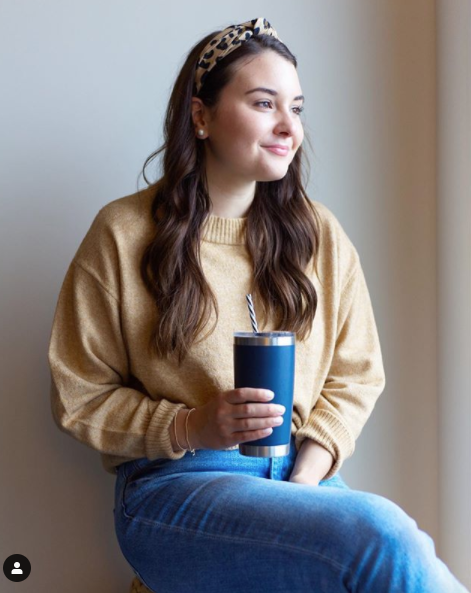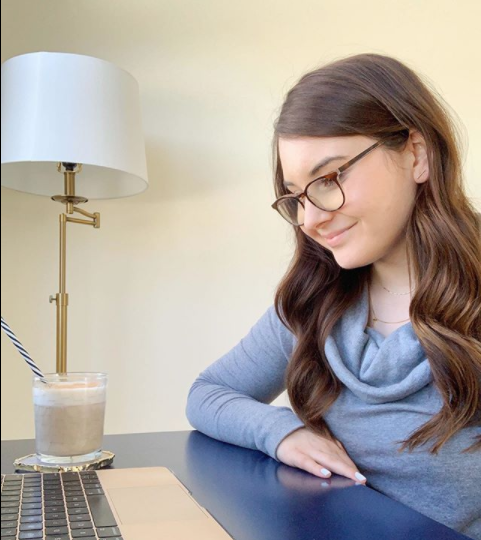I’m SO excited to feature Cara of Always Cara on today’s edition of Women in Science & Medical Mamas. In addition to sharing all of her stylish finds on Instagram and being the sweetest human on Earth, Cara is Speech-Language Pathologist and she works with both patients in the hospital and with kiddos in an outpatient clinic. I connected with Cara earlier this year, and she and I immediately bonded over our passion for language, and speech and swallowing therapy. (Fun fact: my undergrad is in Speech, Language, and Hearing Sciences, and I planned on becoming an SLP before I was waylaid by Public Health.) She’s been such a great source of support as we’ve gone through our own feeding journey with Jacob, and always reaches out with the most comforting and positive reassurance. Cara was kind enough to write her thoughts and experience in her own words to share with you all, and I’m so grateful to her for being willing to share.

Hello – and thank you for taking the time to read my post and support this wonderful site. My name is Cara Koshut and I have been a practicing speech-language pathologist (SLP) since 2016 after completing a 5-year master’s degree program (if you have questions on education/requirements, please feel free to ask!). Since then, I have worked with children in the outpatient setting, their homes, private schools, and daycares and adults in the emergency department, acute care, and ICU.
People often ask why I chose to become an SLP. There are many reasons to choose this great profession. But, I became a SLP because it marries two of my favorite things: health science and helping others. In school, I loved science; it challenged me to not only question, but to also find solutions. As for being a “helper” – I grew up surrounded by helpers. My parents instilled in me the importance of being kind and assisting those in need. I watched my mom as a pharmacist help her patients and make a difference in their lives. Being a SLP allows me to be creative, make a difference, utilize evidence-based practice, and be a part of #womeninscience. One of my favorite quotes from Michelangelo depicts what I think it’s like to be a SLP: “I saw the angel in the marble and carved until I set him free.” I see the potential, and abilities, in all people – and I want to help them achieve that. Every person deserves that. Whether it’s helping a patient regain a skill he or she lost, or a child learn a skill he or she has not yet developed, making an impact in my patient’s lives is a gift. I am so grateful to be trusted with their care.
A typical day of a SLP can be different depending on the population or the facility where he or she is employed. For me, my week-day job is working with children. This is a reoccurring schedule where children have weekly, reoccurring, timeslots. This schedule is usually employed within the school setting, outpatient centers, or home health agencies. In addition to direct treatment time during the week, I collaborate with other educators and health care professionals, complete written evaluations and progress reports (to cover insurance needs), provide caregiver education and home-carryover activities. I see children with varying abilities and diagnosis, such as: Down Syndrome, autism spectrum disorder, articulation disorders, expressive and receptive language disorders, feeding disorders and cognitive deficits. Typically, during an initial session, a formal evaluation is completed to assess the child’s strengths and developmental needs. Following this evaluation, treatment sessions are initiated- which are typically 30 minutes to an hour in length.
As it pertains to my acute care position, I work within a shift schedule. In this case, a SLP is scheduled for an allotted time and sees patients on the caseload during that time period. Typically, this is the standard within a skilled nursing facility or hospital. I see patients with speech, language, cognitive or swallowing needs caused by strokes, falls, and other medical trauma.
My area of specialty is pediatric feeding disorders. I could chat for days about feeding development, diet modifications, problem eating, and more! I would like to stress: if you are looking to get your child help within this area – be sure to contact a SLP or OT specifically specialized in feeding disorders. This means the provider has strong clinical experiences, knowledge on update-to-date research, and has completed continued education within this area of the field. Doing so will ensure that your child is properly cared and treated for, which will positively impact their experience, progress, and more.

Being a SLP also means being flexible. Due to the COVID pandemic, I moved my entire week-day sessions to teletherapy – or online therapy- for about 4 months. The sessions are the same length, just completely online. I continued to work in the hospital, which was definitely an experience that I won’t soon forget. I work with a wonderful rehab team and believe we have handled it as best as we could, given the extreme circumstances.
I love working with both children and adults. I love following children for long-term care, watching them grow, learn and develop. With adults within the acute care setting, I love educating them and their family members. I appreciate helping care for the patient when they are most in need, to piece together parts of the puzzle with the medical team.
While being a woman SLP is not necessarily unique (95% are women – crazy, right!?), I think being a woman in science is extremely important. Having an education, completing an additional degree, having a job within science are all things women have had to work for. I do not take this lightly. I am proud to be a part of the science field, to better understand our world and learn how to improve it.
Alright, let’s talk handouts! I love providing education and resources to equip my patients and their families. I want to leave you with some great links that you can reference beyond this blog post. These links range from the field of speech-language pathology to developmental markers to watch with your child:
- Feeding milestones for children
- Speech development milestones
- Language Development
- Feeding Littles – Offer the Rainbow
- What to Expect from Speech Therapy
Thank you so much for this opportunity, Stephanie. Yay, women in science!
Again, I can’t thank Cara enough for sharing experience and why she loves her work as an SLP so much. I’m so grateful to have connected with Cara this year and to grow this amazing community of women in science! Please be sure to follow Cara on Instagram and LIKEtoKNOW.it to keep up with her work as an SLP and all of the amazing outfits, activities, and recipes she shares!
xo,
Stephanie
Recent Comments